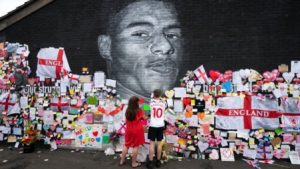
PGCE Economics & Business: raising the attainment of disadvantaged students- ‘heartwork’ and high expectations
Trainees in Economics and Business Education spent a day at Manchester Enterprise Academy in Wythenshawe. The school has a high proportion of students from disadvantaged backgrounds, with over 60% drawing in additional Pupil Premium funding for the school. There are also a high number of students with Special Educational Needs. Wythenshawe is where the footballer and free school meals and poverty campaigner Marcus Rashford was brought up. Research by the Trussel Trust found 2.5 million food parcels were given to UK families in the year to March 2020,
The UoM PGCE course places a focus on social justice in the context of many of the schools and colleges our trainees are placed within Greater Manchester. The gap between the attainment of students from disadvantaged backgrounds and their more advantaged peers widened further during lockdown. Trainees spent the day observing lessons and discussing strategies to ‘close the gap’. Key to this is good and outstanding teaching for all- the best teaching impacts on the success all pupils.

An excellent presentation from Rebecca Tinsley, Assistant Vice Principal, identified strategies that work: the school has a key focus on vocabulary acquisition to build literacy skills and create greater access to the curriculum. This also involves taking students on visits and trips with a focus on developing cultural capital and a broader understanding of society around them. Trainees looked at approaches to support students understanding and use of key subject content in business, including ideas identified in research summaries from the Education Endowment Foundation.
The visit followed up sessions with UoM Professor Carlo Raffo, an expert on disadvantage and poverty in education, on the importance of ‘heartwork’- building strong teacher-student-parent relationships built on trust, empathy and support. This means knowing something about each student as an individual, being authentic and recognising them and their aspirations. Key to this are positivity, praise and confidence building. Poverty is dynamic, with different families moving in and out over time.
Research suggests high expectations of students from disadvantaged backgrounds are important. Key to this is a ‘yes you can’ culture of encouragement and growth, with subject level challenge in each lesson as the norm. The rewards are there on results day.
Being an economics and business teacher is a pleasure and a privilege- the impact we can have on the life chances of young people makes it the best job in the world.





0 Comments